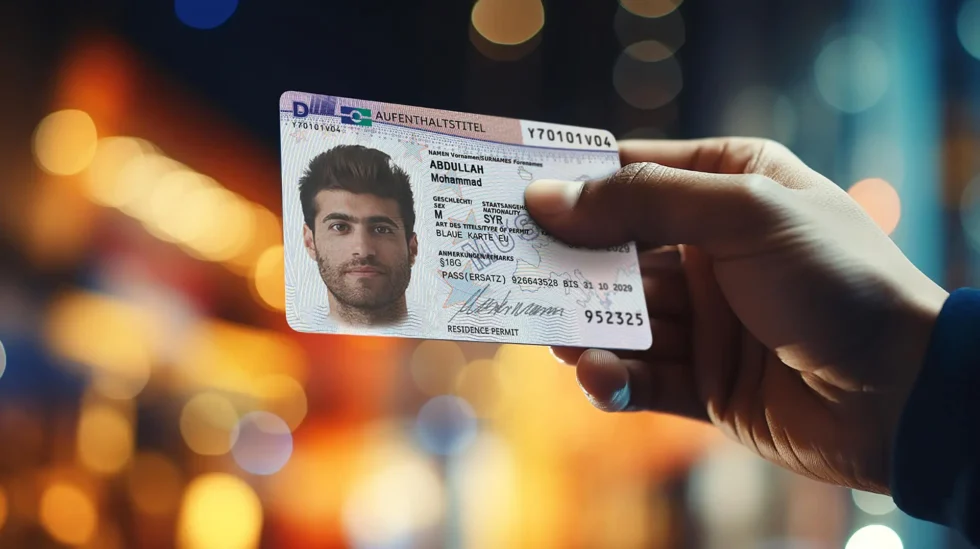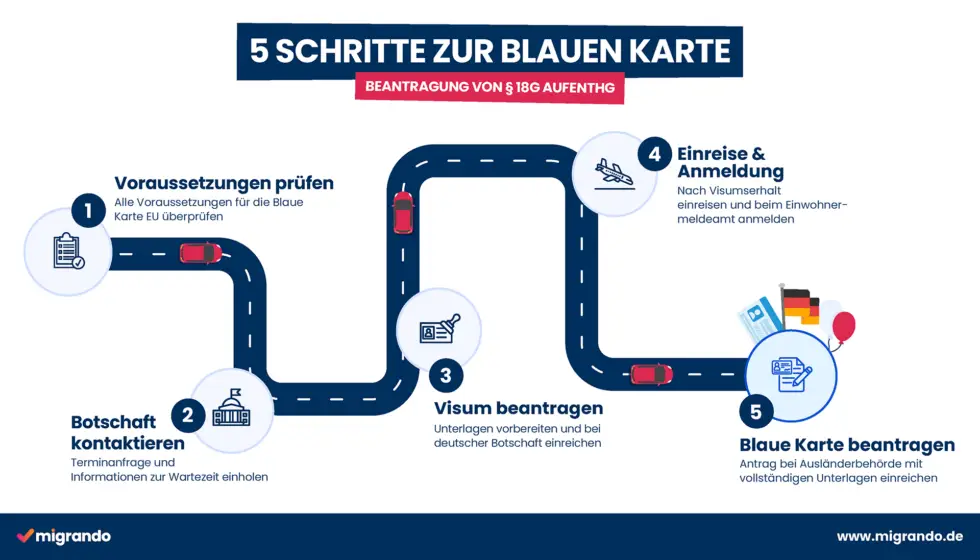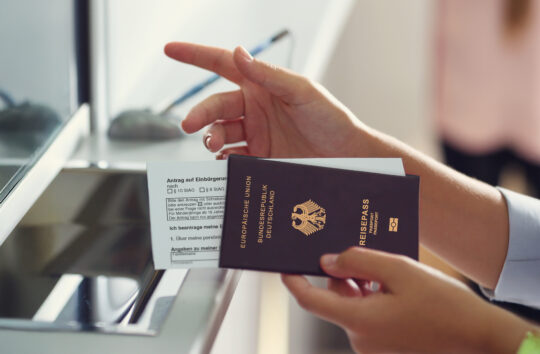What is the Blue Card?
The EU Blue Card is a special permit that allows skilled workers and academics from non-EU countries to work in the EU and can be applied for in all EU member states except Denmark, Ireland and the UK. It was introduced by the EU in 2009 to attract qualified workers and reduce shortages in certain professions. In short, the Blue Card helps people to live and work in the EU.
In summary, the EU Blue Card is an opportunity to strengthen the European economy and offer skilled workers good working conditions in Europe. It facilitates the visa process, simplifies family reunification and provides incentives for long-term residence in the EU. Watch our video to find out everything you need to know about the Blue Card:
The Blue Card: Requirements
The EU Blue Card is a special Residence permit, which is defined in § 18g AufenthG. It is subject to the following conditions:
- University degree: A university degree is an important requirement for the Blue Card in Germany. If this degree was obtained abroad, it must be recognized in Germany or be comparable to a German university degree. You can use the recognition finder or anabin to check whether this is possible.
- Professional experience:
- 1st possibility: A successful educational qualification of at least three years at a university or comparable institution. The competent authority must recognize this qualification as equivalent to a domestic qualification corresponding to level 6 of the European Qualifications Framework(level 6 of ISCED 2011).
- 2nd option: Alternatively, 3 years of professional experience is possible, which must have been gained in the last 7 years. The employment agency will check the validity of this.
- Job offer or employment contract: Another requirement for the Blue Card is an existing employment contract or a written job offer. The job must be in Germany and the employer must have a permanent establishment in Germany.
- Permit from the Federal Employment Agency: If you work in a shortage occupation and your gross annual salary is at least €41,041.80, you need a permit from the Federal Employment Agency to obtain a Blue Card in Germany.
- Health insurance and main residence: You need a main residence in the city or municipality responsible for you and health insurance.
- Blue Card salary 2024: The EU Blue Card 2024 requires a gross salary of at least € 45,300 per year in the standard occupation. This amount is redefined annually. For shortage occupations, the annual salary is currently at least € 41,041.80 gross.
Shortage occupations include, for example, managers in the production and manufacture of goods, in IT and communications, natural scientists, mathematicians and engineers, architects, doctors and teachers.
Apply for a Blue Card
When you apply for a Blue Card, you must make sure you have all the important documents ready and go to the right offices. You will find details on this and what else you need to look out for in the following sections:
Apply for the Blue Card Germany in just 5 steps
The application is a multi-stage process that takes place both in the applicant's home country and in Germany. Here are the 5 most important steps:
- Check requirements: Check whether you meet all the necessary requirements.
- Appointment request to the German embassy: Find out about possible waiting times and additional requirements directly from the embassy or on their website.
- Apply for a visa for Germany: Prepare all documents and submit them to the German embassy or consulate.
- Entry to Germany and registration: After receiving your visa, enter Germany, register at the Residents' Registration Office and make an appointment with Foreigners' office.
- Residence permit - Applying for an EU Blue Card: Apply for an EU Blue Card at the relevant Foreigners' office. Do not forget to check and prepare the list of required documents in advance.
Where do I have to submit the application?
In principle, the Foreigners' office is responsible for issuing the Blue Card. However, there are differences:
- If you are in a third country that requires a visa, the German diplomatic mission there is responsible for this. As soon as they confirm your Blue Card, you will receive a visa.
- If you have a Blue Card from another EU country, you can travel to Germany without a visa. You must apply for a German Blue Card at Foreigners' office within one month of entering the country.
- Entry to Germany without a visa is possible for citizens of the following countries: USA, Republic of Korea, United Kingdom, Japan, Canada, Australia and New Zealand. The Blue Card must then be applied for within 3 months from the place of residence in Germany at the relevant Foreigners' office .
- If you would like to switch from another Residence permit to the Blue Card, you must apply to the Foreigners' office in your place of residence. The requirements are exactly the same as for the other initial situations.
In any case, you can only start your new job as soon as you have received the EU Blue Card.
Which documents are needed?
When applying for an EU Blue Card, it is important that you can present the necessary documents. The number of documents is extensive, which is why a checklist can help you keep an overview. You must bring the following documents with you:
- Application form: You must complete the Blue Card application form when you first apply for a Blue Card and each time you renew it.
- Declaration of employment: You will need this declaration if you are working in a shortage occupation and require a permit from the Federal Employment Agency. This form must be completed by your employer.
- Proof of identity: Your passport is sufficient as proof of identity.
- Rental agreement
- Employment contract or job offer: This must include proof of the minimum salary required and the duration of the employment relationship.
- University degree certificate, license to practice (or recognition thereof)
- Biometric photo: These must meet certain conditions.
- Health insurance: Provide proof of insurance and a certificate that you are paying into the health insurance fund.

With Settlement permit you can live in Germany forever and you will never have to extend your stay again. In this comprehensive article, we explain everything you need to know about Settlement permit . We will show you what advantages you have with the settlement...
How long do I have to wait and how much does it cost?
The processing time for the Blue Card in Germany can take up to 12 weeks. You should therefore arrange a preliminary interview with Foreigners' office around 4-6 weeks before your current right of residence expires.
The Blue Card Germany costs ...
- ... 100 € for the first application.
- ... extension for up to 3 months 96 €.
- ... Extension by more than 3 months € 93.
Turkish nationals pay less for the Blue Card: €22.80 for applicants under 24 and €37 for applicants over 24.
How long is the Blue Card valid for?
The EU Blue Card is valid for a maximum of 4 years. If you have a fixed-term employment contract, it is valid for 3 months longer than your employment contract. You are subject to the obligation to cooperate in accordance with § 82 Paragraph 6 AufenthG. This means that you are obliged to inform Foreigners' office within 2 weeks if the employment relationship ends prematurely. After two years, the obligation to the employer can be lifted. An application must be submitted for this, which is regulated by the Employment Ordinance (BeschV).
The Blue Card can also be extended. A new application must always be submitted for the extension. After 27 months, however, you can apply for Settlement permit § 18c AufenthG. If you have sufficient language skills (B1), you can apply for the Settlement permit after just 21 months.
After 5 years, you can apply for EU permanent residence if you have an EU Blue Card. The prerequisite is that you can provide for your family and yourself and prove that you are integrated in Germany.
What are you allowed to do with the Blue Card?
The possibilities offered by an EU Blue Card are extensive and cover various areas, which we will discuss in the following sections.
Travel options with the Blue Card
With an EU Blue Card, you can travel to other Schengen states without a visa for up to 90 days for tourism reasons. You can use up these 90 days within 180 days.
If you are outside Germany for longer than 12 months at a time, your German Blue Card will become invalid. You can only prevent this if you can prove that the extension is in the interests of the Federal Republic of Germany. This could be because you are working abroad for a German company, for example. The Foreigners' office must agree to this.
The following graphic shows which European countries you can travel to with the Blue Card.
Easier family reunification with the Blue Card
The issue of family reunification is easier to fulfill with the Blue Card than with other residence permits. Spouses are entitled to a residence permit with an unrestricted work permit even without German language skills(Section 30 (1) sentence 3 no. 5 AufenthG).
If the spouse has a residence permit from a Schengen country, he or she can come to Germany virtually without a visa. This is regulated by § 39 AufenthV.
Requirements for sufficient living space do not apply to residence permits in Germany in accordance with Section 29 (5) AufenthG.
Other rights associated with the Blue Card are:
- Residence permit for Germany according to § 18g AufenthG
- Relieved Settlement permit
- Work permit according to § 18g AufenthG

Get help with your Blue Card application now
Despite problems such as the complicated procedure or having to reapply in every EU country, the German Blue Card offers many people the opportunity to obtain a Settlement permit more quickly. However, there are numerous points to consider when applying so that the whole process is completed as quickly as possible.
FAQ - frequently asked questions about the EU Blue Card
Why is a Blue Card worthwhile?
The Blue Card is worthwhile for many reasons. It speeds up the process of obtaining the Settlement permit, facilitates family reunification, enables easy travel within the EU and much more.
What are the requirements for the Blue Card?
The Blue Card has the following requirements:
- a university degree,
- an employment contract or a concrete job offer,
- compliance with the minimum earnings thresholds (€45,300 gross per year in 2024; €41,041.80 gross per year for shortage occupations),
- health insurance
- and a main residence in Germany.
How long is the Blue Card valid for?
The Blue Card is valid for a maximum of 4 years. If you are in a fixed-term employment relationship, it is valid for 3 months longer than your employment contract. You can apply for the Settlement permit after 27 months. The period is reduced to 21 months if you have language skills at B1 level.
How high must the salary be in 2024 according to the EU Blue Card?
According to the EU Blue Card, a salary of at least €45,300 gross per year is required in 2024 in a standard occupation. For shortage occupations, the Blue Card sets the salary in 2024 at a minimum of €41,041.80 gross per year.









